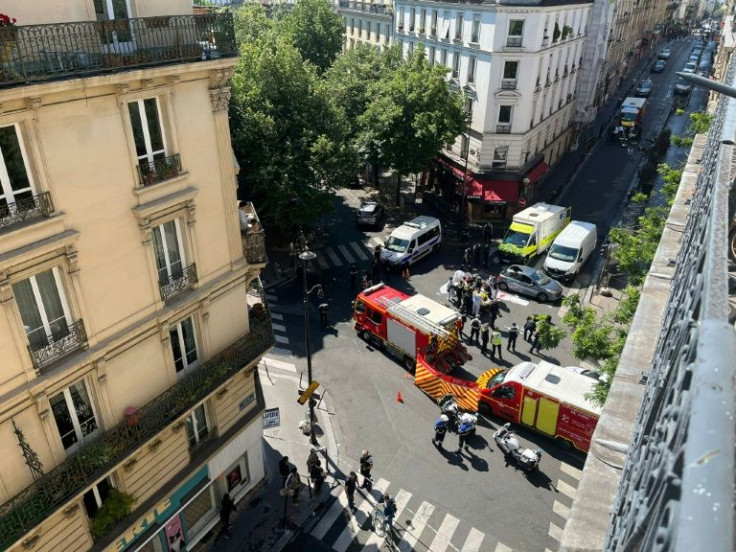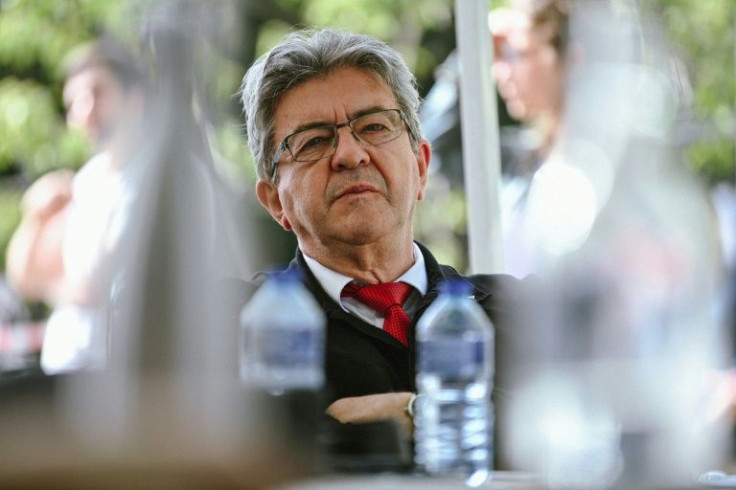Police Violence In Spotlight As French Parliament Vote Looms
A fatal police shooting in Paris has thrust the issue of police violence to the heart of a tight French parliamentary election battle between a new left-wing coalition and allies of centrist President Emmanuel Macron.
Police shot a woman dead in a car in northern Paris on Saturday morning after the vehicle failed to stop when summoned by officers and then allegedly drove towards them at speed.
"If you vote for me, I'll change the doctrine governing the use of force by the police in our country," Jean-Luc Melenchon, leader of the Nupes left-wing alliance, told France Inter radio on Tuesday.
"It's not normal that we kill someone for failing to stop," he added, saying that four people had died in such circumstances in four months including two on the night of the presidential election in April.
"The police kill," he tweeted on Saturday, sparking condemnation from rival politicians and Interior Minister Gerald Darmanin ahead of the two-stage vote on June 12 and 19.
Saturday's shooting came just a week after police were widely condemned over their conduct at the Champions League final in Paris, where they teargassed football fans and failed to stop street crime by local youths.
Images of frustrated passengers being teargassed outside a Paris train station over the weekend after rail services were cancelled also fed questions about their methods.

"I find Jean-Luc Melenchon's way of systematically criticising the police with totally outrageous comments to be very shocking," Prime Minister Elisabeth Borne said on Tuesday.
The three officers involved in Saturday's shooting late morning in Paris's 18th district say they opened fire on the car in self-defence.
The four people inside were on their way home after a night of clubbing, with one of the passengers, Ibrahima, telling RTL radio that the vehicle was in traffic and did not hit any officer.
The 38-year-old driver, who has been hospitalised with a throat injury, has a long criminal record and no driving licence, Le Parisien newspaper reported.
A woman in the front seat was hit in the head by one of the nine shots fired by the officers, who were detained after the incident but released without charge on Tuesday.

The use of force by French police is a longstanding and divisive political issue in France, with Melenchon and other left-wingers frequently criticising their tactics.
Darmanin said Monday that police "deserve respect" and that "insulting them dishonours those that want to govern".
Far-right leader Marine Le Pen said Tuesday that Melenchon "is always on the side of thugs, of criminals. He's never on the side of the security forces."
Although several incidents of police violence have caused outrage in France in recent years, attacks on the force by jihadists and criminals have also sparked bouts of public sympathy.
Police unions also complain about poor pay for officers and difficult working conditions, particularly in low-income suburbs where hostility to them is deeply rooted.
Campaigning ahead of Sunday's vote is set to intensify this week, with Macron making several trips around the country to lend support to his centrist "Ensemble" ("Together") coalition.
Surveys suggest "Together" is on course for a narrow majority, but the results are viewed as hard to forecast because abstention is predicted to reach record levels of around 50 percent.
Melenchon and the Nupes alliance -- which groups his France Unbowed party, the Socialists, Greens and Communists -- are hoping for a majority to thwart newly re-elected Macron.
The first round of voting in 11 constituencies representing French people living overseas took place on Sunday, with centrist candidates leading their rivals from Nupes.
But increasingly fierce attacks on Melenchon in recent days by Macron's allies are interpreted as a sign of nervousness in the ruling party by some analysts.
Senior MP Christophe Castaner said the former Trotskyist promised a "Soviet revolution", while Economy Minister Bruno Le Maire called him a "French Chavez" in reference to late Venezuelan leader Hugo Chavez.
Melenchon is promising to lower the retirement age to 60, introduce wealth taxes on companies and high-earners, and hike the minimum wage by around 15 percent.
Macron needs a parliamentary majority in order to push through his domestic agenda of tax cuts, welfare reform and raising the retirement age.
The 44-year-old defeated Le Pen in the second round of the presidential election on April 24, winning a second five-year term.
© Copyright AFP 2024. All rights reserved.





















